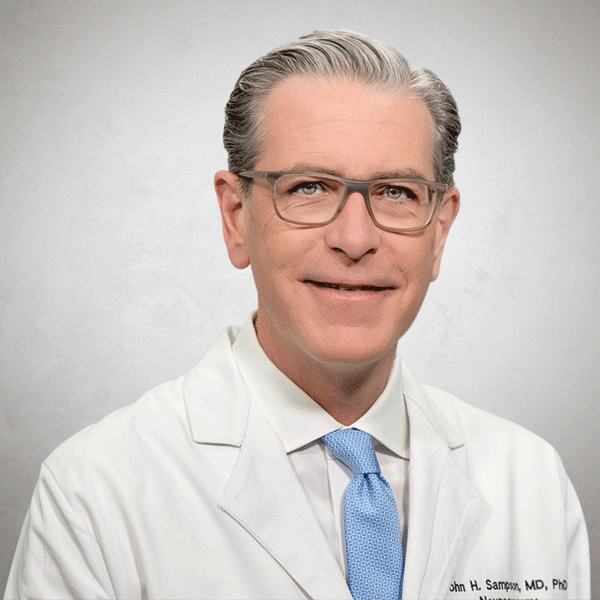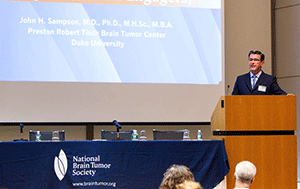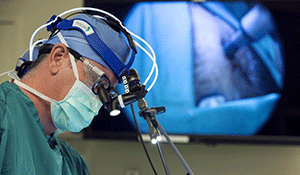A Conversation with John Sampson, MD, PhD, MHSc, MBA

Duke Pathology Adjunct Professor John Sampson, MD, PhD, MHSc, MBA, dean and vice chancellor of the University of Colorado School of Medicine—an inspirational leader, educator, scientist, and clinician—was the keynote speaker for the department’s 2025 Scientific Retreat. He gave a brief history of his career, provided highlights of his research at Duke, discussed the role of entrepreneurship, and closed by covering the major lessons he’s learned over the years.
Sampson is a Duke alumnus, neurosurgeon, and researcher who is passionate about treating patients with brain tumors and other diseases of the nervous system and spine. With a career spanning over 25 years, he has authored nearly 300 peer-reviewed publications.
As the inaugural chair of the Department of Neurosurgery at Duke, he demonstrated visionary leadership and a commitment to innovation and excellence. After serving as chair from 2015 to 2020, Sampson went on to become the senior vice president of Duke University Health System (DUHS). Under Sampson’s leadership, Duke Private Diagnostic Clinic (PDC), one of the largest multi-specialty physician groups in the country, was integrated into the Duke Health enterprise as Duke Health Integrated Practice (DHIP). He served as its inaugural leader from 2018 to 2020.
In 2019, he was elected as a member of the prestigious National Academy of Medicine in recognition of his outstanding contributions to medicine, particularly in the treatment of brain tumors and his groundbreaking research in immunotherapy and precision drug delivery.
Sampson’s career has taught him that sometimes one has to take risks and fail big to learn something meaningful and make progress.
In a conversation ahead of the Scientific Retreat, he shared some insights with us about his career path, values, and goals:
What attracted you to the field of neurosurgery and research in pathology?
My career took many turns before choosing pathology, but I always knew it would involve teaching and research. I pursued my medical degree at the University of Manitoba in Winnipeg, Canada, where I grew up. There, I was allowed to do paid research during the summer. The mentor I chose to work with was a neurosurgeon. I was invited into operating room one day, and at that time microsurgery was being performed under a microscope. I was fascinated to learn that the limitations on what you could do surgically were your eyes and not your hands. After that, I was hooked.
I had a fraternity brother in Winnipeg who recommended that I do an externship. I was attracted to the idea of being a physician-scientist and was introduced to idea of earning a PhD in pathology. So in 1990 I headed to Duke, which promised extraordinary scientific rigor and a chance to focus on research.
What was it like being a Duke resident?

Duane Mitchell, MD, PhD, was a pathology resident at time who decided to step out of residency to allow himself to focus on research. We partnered and did great things together. (During his tenure at Duke, Mitchell served as the Director of Preclinical Research at the Preston Robert Tisch Brain Tumor Center and as the Associate Director of the Duke Brain Tumor Immunotherapy Program.)
I completed my residency in 1998 and remained at Duke until 2024. It felt like family to me, and the departments of Pathology and Surgery supported my work in the lab while I served as chief resident in Neurosurgery. The key thing about pathology is that it bridges clinical practice and graduate school better than other departments. As a resident, I had the opportunity to stay at Duke for research and decided that I wanted to do cancer and brain tumor research.
What was it like doing your research training under an internationally renowned neuro-oncologist and Nobel Laureate?
I had the opportunity to work with the late Gertrude Elion, who won a Nobel Prize for medicine in 1988; the E. L., Lucille F. Jones Cancer Distinguished Research Professor Darell Bigner, MD, PhD, an internationally-renowned neuro-oncologist; and Allan Friedman, MD, the Guy L. Odom Distinguished Professor of Neurosurgery and division chief at the time They were among the many extraordinary researchers at Duke.
These neuro-oncology luminaries gave me opportunities to be recognized in the field earlier than I would have been otherwise. Much of my career has leaned on what others say about what I’ve done and how I’ve performed. My Duke Pathology mentors catapulted me into being recognized because of the potential promise I held. I try to give back in the same way now.
What do you consider to be your biggest achievements and failures?

When I was working at Duke during its transition to DHIP, it was a difficult time for me and many other chairs and leaders. I was able to aid in aligning the school with the health system and, as a result, have seen positive changes in our physician practice.
My biggest achievement, though, has been witnessing the people I mentored and supported succeed.
When I look back over the years spent dedicated to my career, I see the small things every day that I didn’t do for myself or my family as a failure. I tried to attend important events for my kids, of course, but could have been there more. Also, I didn’t practice wellness and self-care consistently.
If you could go back and say “yes” to something, what would it be?
I’ve taken a lot of opportunities and risks, and I don’t have regrets. Staying at Duke after my residency allowed me to continue a dual career path. I wish I had taken time to do a fellowship or research away to develop new techniques. In fact, I had a chance to go to Switzerland to work with a famous immunologist, but I have no regrets staying at Duke as long as I did.
I didn’t aspire to become a dean. I just of followed the path I was on. I was attracted to the University of Colorado School of Medicine because I saw a tremendous amount of opportunity and liked the people and culture.
What advice would you give your younger self?
Enjoy the ride, because the journey is more important than end point. But prepare to have more than one career. My initial career as the third-busiest surgeon at Duke evolved to lead me back to the lab. I became a top-ranked clinical researcher in my field for nearly a decade, then I became a chair as part of an administrative career. Career road maps take you in different directions, and that means you can take risks. So, take more risks on people and ideas. If we’re conservative in academic medicine, then we’ll miss out.
Shortly after accepting his current position as dean in July 2024, Sampson asked his boss why he was chosen for the leadership role. He said he was impressed with Sampson because, despite the fact that his resume was impressive and his National Academy of Medicine award even more impressive, he never mentioned the award in the interview.
“He also told me my only metric should be to take risks which is pretty unusual coming from an academic leader.”
Duke Pathology leaders were deeply honored to welcome Sampson as the keynote speaker at our Scientific Retreat on Sept. 20th, 2025—and we have no doubt he left a lasting impression on all who attended.